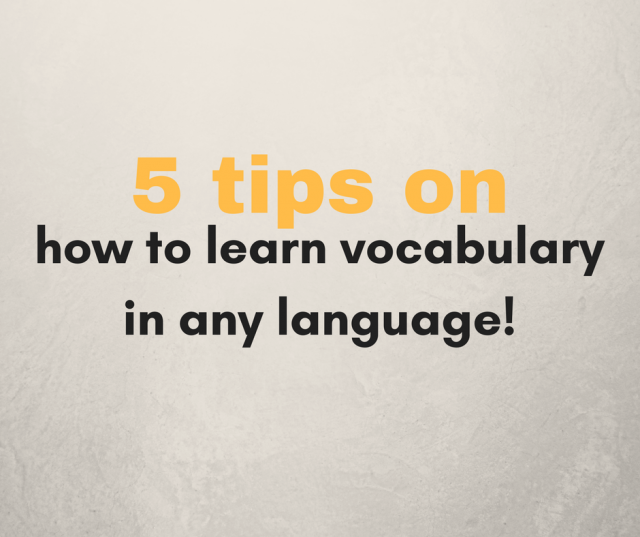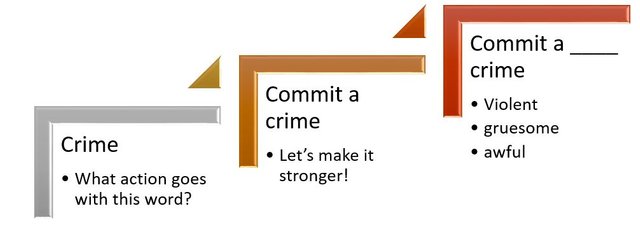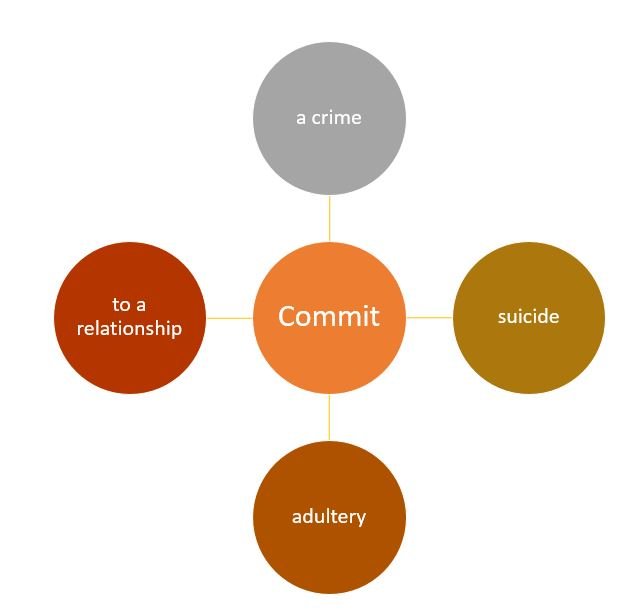
Hi Steemers! Today a post for all language learners! Whether you are studying English, French, Spanish or Hungarian this post is for you! I will give you some tips on how to learn vocabulary effectively using various methods and techniques. As I am an English teacher (EFL - English as a foreign language, ESL - English as a second language) I will be giving you examples based on studying English vocabulary, but you can substitute English to the language that you are learning.
A Little Pep Talk
Firstly, let me state it loud and clear that there is no fast way of learning vocabulary or another foreign language for that matter. It is a long process that requires patience, motivation and endurance. Learning a language is like exercising or going to the gym. If you want to lose weight or build some muscle you need to be consistent. Lifting weights once a week no matter how intensely is not going to help... Same rule applies to all you Davids there in the world. If you start slacking, you will go from this:
to this:

Isn't that lovely? Which means if you learn a language and stop using it, you will eventually forget everything or at least most of it.
I'm no saint either! If only I had been more consistent in learning Spanish, I could possibly be trilingual now... Anyways, you get the idea. No gain without pain and suffering...
How to make the "suffering" less painful?
It's never about long lists of vocab that you simply repeat and hope to remember, although for many that is a good technique.
1) Let's start with a very important rule: NEVER LEARN ANY NEW WORDS IN ISOLATION. Remember to learn in chunks, whole phrases. What do I mean? English example:
You learn the word crime.
Great!
Why not go a step further and check in a good online dictionary (link to my post about that here ) that the verb that goes with crime is: commit a crime.
Excellent!
You could go even further and find adjectives that go with that: commit a violent/gruesome/awful crime. Have a look at the visualization below:

2) If you are visual learners (in other words the diagram above made you think "I get this", "I like this") this tip is for you!
Instead of of creating long boring lists of words/phrases you can make them nice and colorful so that they jump at you from the page. When I teach I have a lot of mind maps on the board and my students tell me they enjoy this method and find it much clearer when they need to revise the material a few weeks later.
Examples: Different collocations with the verb commit:

Where the focus is on the verb and what it can be used with. Or different verbs that go with the noun meeting (believe it or not, my business students love learning this way!)

Fun isnt' it?
3) If you are more kinesthetic learners (you need to move when you learn) this tip is for you!
I used to study history in high school this way. I had my notebook open with the dates, events, and consequences in front of me and I would walk in circles around my room reading to myself loudly and telling myself stories. I used exactly the same technique when I was preparing for a speech to give, or, you guessed it, when studying Spanish vocabulary. This works because you involve a lot of your body in the process of learning. You read, listen (to yourself speaking), and walk around. This also means you are more relaxed, your blood flows better, your lungs get more air and your back doesn't suffer (as you're not hunched at your desk).
4) Immerse yourself in the culture!
It is much easier to learn new things if you are having fun in the process.
a) Be active on various message boards! You don't know a word? Check it, write it down, use it in your post a few times, and it will be stored in your long-term memory!
b) Listen to your favorite music! My BF learned countless phrases this way! Be careful though! Check the lyrics first, read them carefully. You don't want to finish like this woman:
c) Find people that speak the language you are learning and make friends! It could be through option a) or you can check out e.g. https://www.interpals.net/. Lots of countries, lots of nationalities, and also (unfortunately) a lot of freaks... But you can still find someone nice to chat with...
5) Use technology!
Nowadays, there are many apps that help you learn. You might even know more than I do :) I can definitely recommend QUIZLET -> if you'd like me to write a post on how to use it to create word lists and play with them - let me know in the comments below!
To sum up: be patient and cherish your time with the language you are learning. You will not regret it, as you would not regret a wonderfully chiseled body :)
That is all for today :) I hope you enjoyed this post, if you have any questions let me know.
If you have any suggestions for future posts, also please let me know. And don't forget to follow me! @cwbrooch!
ANOTHER LANGUAGE POST -> 11 tips for improving your listening skills

@cwbrooch, thanks for your work to help education. Context is so important!
Downvoting a post can decrease pending rewards and make it less visible. Common reasons:
Submit
I agree with a lot of what you are saying. I am also an ESL teacher in South Korea. It's really funny when I tell my students that less is more. Everyday they have to memorize 30 words for their vocabulary test. Just straight memorization. No use in a sentence or anything like that. So robotic and unnatural. Good post. Everyone is a different learner but straight memorization is not ideal for language acquisition. Good post
Downvoting a post can decrease pending rewards and make it less visible. Common reasons:
Submit
Rote memory - Aagh! I am glad to hear from others who understand the value of context.
Downvoting a post can decrease pending rewards and make it less visible. Common reasons:
Submit
Hey fellow E teacher! follow me as I will be posting lessons :)
Downvoting a post can decrease pending rewards and make it less visible. Common reasons:
Submit
definitely not! some context would be good :)
Downvoting a post can decrease pending rewards and make it less visible. Common reasons:
Submit
Downvoting a post can decrease pending rewards and make it less visible. Common reasons:
Submit
The apps I use are Duolingo and Memrise.
Downvoting a post can decrease pending rewards and make it less visible. Common reasons:
Submit
excellent! how is memrise working for you?
Downvoting a post can decrease pending rewards and make it less visible. Common reasons:
Submit
It's ok but not great. A lot depends on getting a lesson that is well structured and well made. The thing about Memrise is it has a low barrier to entry for content creators. That means I can find much more "fringe" languages but the quality of content is extremely variable.
I prefer Duolingo, but its insistence on Q&A means that it takes considerable effort for a new language to become available.
Downvoting a post can decrease pending rewards and make it less visible. Common reasons:
Submit
We're developing this and hope we can make something that let's you learn immersively in VR https://steemit.com/vr/@astralship/is-language-learning-a-killer-app-for-vr
Downvoting a post can decrease pending rewards and make it less visible. Common reasons:
Submit